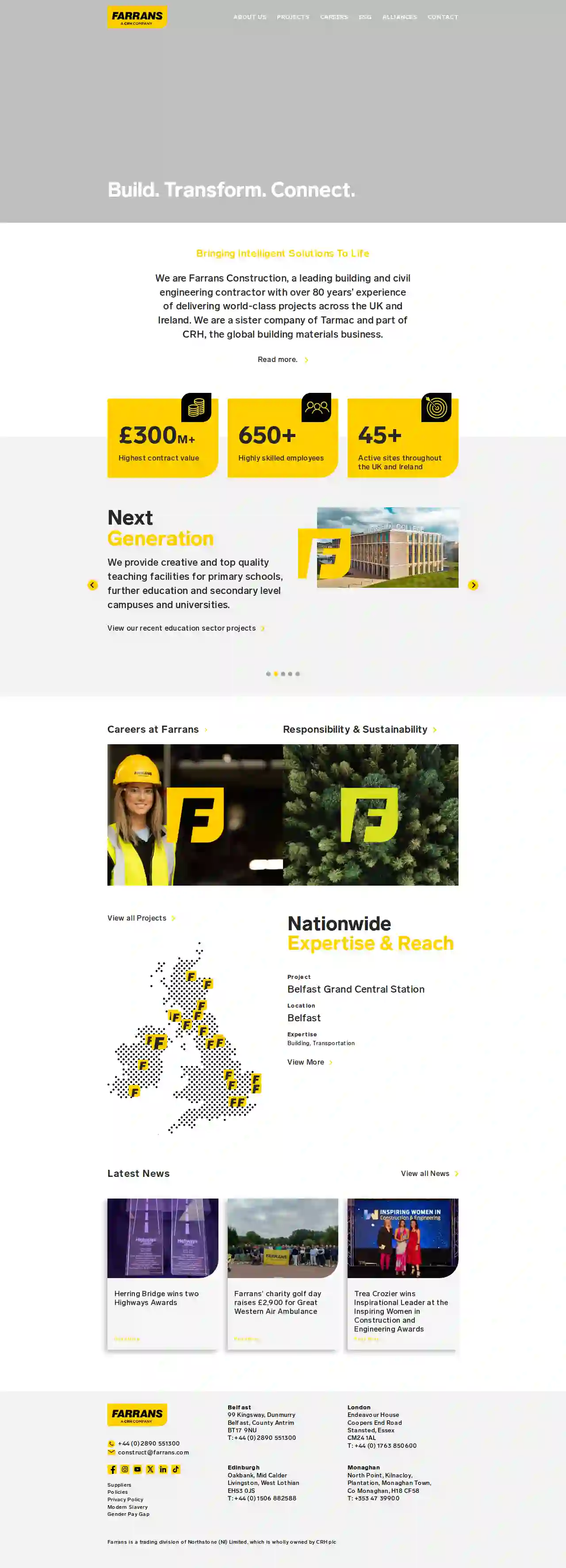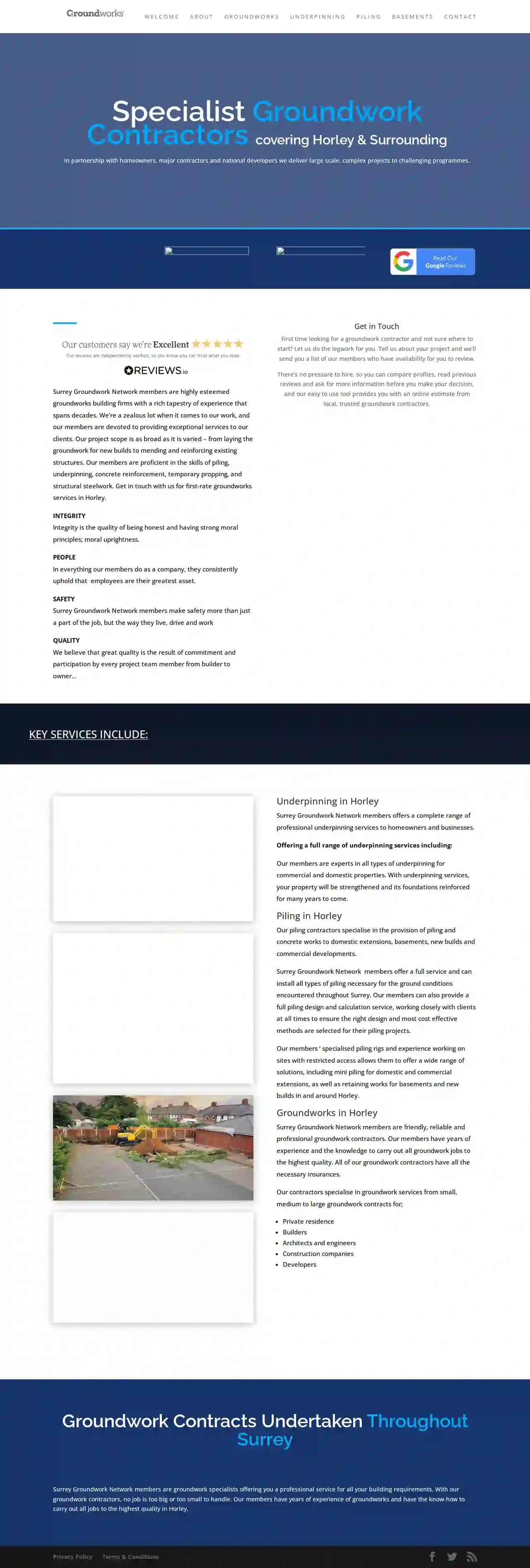Excavation Contractors Wakefield
Find the best Excavation Contractor in Wakefield
Receive up to 3 Excavating Contractors quotes for your project today! Compare profiles, reviews, accreditations, portfolio, etc... and choose the best service.

Farrans Construction
4.34 reviewsBelfast, County Antrim, 99 Kingsway, Dunmurry, BT17 9NU, GBBuild. Transform. Connect. Bringing Intelligent Solutions To Life We are Farrans Construction, a leading building and civil engineering contractor with over 80 years’ experience of delivering world-class projects across the UK and Ireland. We are a sister company of Tarmac and part of CRH, the global building materials business.
- Services
- Why Us?
- Gallery
Get Quote
Dual Piling Ltd
51 reviewsThe Forge, Ockham Lane, The Forge Ockham Lane Cobham Surrey, Cobham, KT11 1LU, GBBuild on our firm foundations Dual Piling Ltd is well-trusted and known for delivering high quality groundworks and piling projects. Basements We are experienced at building basements and can take your project from your initial idea to completion. Alternatively, we can provide just a structural shell or a structural waterproof shell ready for fit out. We utilise a number of different methods to form the basement depending on the ground conditions, proximity to other buildings and whether there is an existing building on top. Groundworks Dual Piling provide a complete range of groundwork solutions from site investigations and design to installation and testing. We specialise in difficult sites where there is difficult access, low headroom, restricted working areas or difficult ground conditions and we can use electrically powered rigs for environmentally sensitive areas. Piling Dual Foundations provides a complete range of groundwork solutions from site investigations and design to installation and testing. We specialise in difficult sites where there is difficult access, low headroom, restricted working areas or difficult ground conditions and we can use electrically powered rigs for environmentally sensitive areas. Large Projects Big projects for us are full residential or commercial building foundations, basements, large scale piling operations and swimming pools. These are mostly commissioned by building contractors and project managers. Smaller Projects Smaller projects for us are residential home extension foundations, concrete slabs for outbuildings/garages, underpinning and retaining walls. About Our Company Dual Piling provides expert piling services in the South West, London and Home Counties for domestic and commercial construction projects. We are one of the region’s leading piling and groundworks companies – offering a one stop shop for pile and foundations design, drainage and floor construction to supply the full foundation package. As a family business established for over thirty years, we are proud of our reputation for reliability and expertise. Our experience extends to cover many different types of foundation solutions, including working on restricted access sites. As a piling and groundworks contractor we offer a wide range of foundation services to both domestic and commercial customers. For piling, mini piling, continuous piled walls, retaining walls, ground beams and slabs, block and beam floors, drainage, underpinning and associated works. What our customers say SBPM Constuction Ltd Horsley, Surrey I have used Dual Piling for many projects over the years ranging from small extensions to house foundations packages and I am never disappointed with the results I get. The whole Dual Piling crew that Tony has on board are excellent at their trade and will always go the extra mile. Whichever Dual Piling crew are on my sites, they are always hardworking, approachable and always leave me with a fantastic clean job. Peter B. - House Developer, Coldharbour, Dorking, Surrey I reached out to Dual Piling for a house foundation plan which required piling and ground beams for 3 houses I was building for a client in Guildford. Dual Piling were fantastic to deal with and left me with an impeccable job to which my bricklayers said it was the best surface on which they had ever laid bricks! Dual Piling are a friendly family run company who were very approachable and while I was on site with the client, would come over and answer any questions we had about the project and would talk the client through the next stages, which I felt was a great personal touch leaving the client very happy and assured. Dual Piling left me an outstanding house foundation from the piling stage to the ground beams and garage reinforced concrete slabs and I will be using them again on my next project without hesitation. Neil M. House Owner Bookham, Surrey Dual Piling did the piling and ground beams for my small back extension for my new kitchen diner. Dual Piling were great from start to finish, from the piling and ground beam design to the finished product leaving the site spotless. Myself and my incoming builder were extremely happy with the finished project. This set us up perfectly to carry on with the next stage.
- Services
- Why Us?
- Our Team
- Testimonials
- Gallery
Get Quote
DC Groundworks & Landscapes
1Ossett, GBSpecialist Groundwork Contractors covering Horley & Surrounding In partnership with homeowners, major contractors and national developers we deliver large scale, complex projects to challenging programmes. Surrey Groundwork Network members are highly esteemed groundworks building firms with a rich tapestry of experience that spans decades. We’re a zealous lot when it comes to our work, and our members are devoted to providing exceptional services to our clients. Our project scope is as broad as it is varied – from laying the groundwork for new builds to mending and reinforcing existing structures. Our members are proficient in the skills of piling, underpinning, concrete reinforcement, temporary propping, and structural steelwork. Get in touch with us for first-rate groundworks services in Horley. Our Values INTEGRITY Integrity is the quality of being honest and having strong moral principles; moral uprightness. PEOPLE In everything our members do as a company, they consistently uphold that employees are their greatest asset. SAFETY Surrey Groundwork Network members make safety more than just a part of the job, but the way they live, drive and work QUALITY We believe that great quality is the result of commitment and participation by every project team member from builder to owner… Get in Touch First time looking for a groundwork contractor and not sure where to start? Let us do the legwork for you. Tell us about your project and we’ll send you a list of our members who have availability for you to review. There’s no pressure to hire, so you can compare profiles, read previous reviews and ask for more information before you make your decision, and our easy to use tool provides you with an online estimate from local, trusted groundwork contractors.
- Services
- Why Us?
- Gallery
Get Quote
Over 11,537+ Excavation Contractors in our network
Our excavation providers operate in Wakefield & beyond!
ExcavationHQ has curated and vetted the Best Excavation Businesses near Wakefield. Find a reliable pro today.
Frequently Asked Questions About Excavation Contractors
- Clearly Define the Scope: Outline the project's goals, including the excavation area, depth, grade, and intended use.
- Obtain Necessary Permits: Research and acquire any required permits from your local authorities.
- Mark Utility Lines: Contact your utility companies to locate and mark underground utilities to prevent damage.
- Communicate with Neighbors: Inform your neighbors about the project's timeline and potential noise or disruptions.
- Prepare the Site: Clear any obstacles, such as vegetation, furniture, or structures, from the excavation area.
- Discuss Safety Protocols: Review safety procedures with the contractor to ensure a safe work environment.
- Experience: Choose contractors with a proven track record and years of experience in excavation projects similar to yours.
- Licensing and Insurance: Verify that they are properly licensed to operate in your area and carry adequate insurance to protect you from liability in case of accidents or damage.
- Equipment and Resources: Ensure they have the necessary equipment and resources to handle your project efficiently and safely.
- Positive Reviews and References: Check online reviews and testimonials from previous customers. Request references and contact them to inquire about their experience with the contractor.
- Professionalism: Opt for a company that communicates clearly, provides detailed and transparent estimates, and has a responsive and courteous team.
- Clear the Area: Remove any obstacles, including vehicles, outdoor furniture, landscaping features, or structures, from the excavation zone and surrounding area.
- Mark Existing Features: Identify and mark underground utilities, septic tanks, sprinkler systems, or other buried elements you want to protect.
- Protect Landscaping: Use tarps or fencing to shield trees, shrubs, gardens, or other landscaping elements from damage.
- Provide Access: Ensure the excavation contractor has clear access to the work area, including gates wide enough for equipment.
- Discuss Logistics: Coordinate with the contractor regarding parking arrangements, material delivery, and any special instructions or concerns you might have.
- Hauling to Designated Disposal Sites: Transporting excavated material to approved landfills or recycling centers.
- Recycling or Reuse: If suitable, some excavated soil might be recycled for other projects or reused on-site for landscaping or backfilling.
- Complying with Regulations: Adhering to local and environmental regulations for soil disposal to prevent contamination or illegal dumping.
What should I do before excavation starts?
How do I find a good excavation contractor?
How do I prepare my property for excavation?
How do you handle soil disposal after excavation?
What should I do before excavation starts?
- Clearly Define the Scope: Outline the project's goals, including the excavation area, depth, grade, and intended use.
- Obtain Necessary Permits: Research and acquire any required permits from your local authorities.
- Mark Utility Lines: Contact your utility companies to locate and mark underground utilities to prevent damage.
- Communicate with Neighbors: Inform your neighbors about the project's timeline and potential noise or disruptions.
- Prepare the Site: Clear any obstacles, such as vegetation, furniture, or structures, from the excavation area.
- Discuss Safety Protocols: Review safety procedures with the contractor to ensure a safe work environment.
How do I find a good excavation contractor?
- Experience: Choose contractors with a proven track record and years of experience in excavation projects similar to yours.
- Licensing and Insurance: Verify that they are properly licensed to operate in your area and carry adequate insurance to protect you from liability in case of accidents or damage.
- Equipment and Resources: Ensure they have the necessary equipment and resources to handle your project efficiently and safely.
- Positive Reviews and References: Check online reviews and testimonials from previous customers. Request references and contact them to inquire about their experience with the contractor.
- Professionalism: Opt for a company that communicates clearly, provides detailed and transparent estimates, and has a responsive and courteous team.
How do I prepare my property for excavation?
- Clear the Area: Remove any obstacles, including vehicles, outdoor furniture, landscaping features, or structures, from the excavation zone and surrounding area.
- Mark Existing Features: Identify and mark underground utilities, septic tanks, sprinkler systems, or other buried elements you want to protect.
- Protect Landscaping: Use tarps or fencing to shield trees, shrubs, gardens, or other landscaping elements from damage.
- Provide Access: Ensure the excavation contractor has clear access to the work area, including gates wide enough for equipment.
- Discuss Logistics: Coordinate with the contractor regarding parking arrangements, material delivery, and any special instructions or concerns you might have.
How do you handle soil disposal after excavation?
- Hauling to Designated Disposal Sites: Transporting excavated material to approved landfills or recycling centers.
- Recycling or Reuse: If suitable, some excavated soil might be recycled for other projects or reused on-site for landscaping or backfilling.
- Complying with Regulations: Adhering to local and environmental regulations for soil disposal to prevent contamination or illegal dumping.